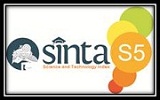HUBUNGAN ANTARA PERSEPSI SISWA MENGENAI PENANGGUNG JAWAB PENGELOLAAN SAMPAH DENGAN CARA MENGELOLA SAMPAH DI RUMAH
Abstract
Keywords
Full Text:
PDFReferences
Aliman, M. Budijanto, Sumarmi, & Astina, I. K. (2019). Improving Environmental Awareness of High School Students’ in Malang City through Earthcomm Learning in the Geography Class. International Journal of Instruction, 12(4), 79-94.
Banga, M. (2011). Household knowledge, attitudes and practices in solid waste segregation and recycling: The case of urban Kampala. Zambia Social Science Journal, 2(1), 27-39.
Desa, A,. Kadir, A. N. B., & Yusooff, F. (2012). Environmental awareness and education: A key approach to solid waste management (SWM) – A case study of a University in Malaysia. In L. F. M. Rebellon (Eds.), Waste management – An integrated vision (pp. 101-112).
Deveci & Cepni. (2017). The effect of entrepreneurship education modules integrated with science education on the entrepreneurial characteristics of pre-service science teachers. Social Work Research Journal. 15(2), 56-85.
Fitriana, Surbakti, A., Marpaung, R. R. (2015). Kreativitas siswa pada materi daur ulang limbah menggunakan model PjBL. Jurnal Biomedik: Wahana Ekspresi Ilmiah. 7(3), 11-19.
Gall, M. D., Gall, J. P., Borg, W. R. (2002). Educational research an introduction 7th. United States: Pearson Education, Inc.
Hasanah, H. (2017). Program CSR terhadap lingkungan hidup. Retrieved from https://geotimes.co.id/opini/program-csr-terhadap-lingkungan-hidup/.
Huda, N., Dewi, N. R., (2012). Pemanfaatan kertas bekas bungkus rokok untuk meningkatkan keaktifan siswa dalam membuat rangkaian listrik 3 in 1. Unnes Science Education Journal, 1(1), 44-49.
Joseph, K., Rajendiran, S., Senthilnathan, R., Rakesh, M. (2012). Integrated appriach to solid waste management ini Chennai: an Indian metro city. Journal of Material Cycles and Waste Management, 14(2), 75-84.
Karak, T., Baghat, R,. & Bhattacharyya, P. (2012). Municipal solid waste generation, composition, and management: The world scenario. Critical Reviews in Environmetal Science and Technology, 42(15), 1509-1630.
Karyanto, P. (2019). Non-curricular strategies in the implementation of education for sustainable development in three prominent green schools in Indonesia. Journal of Physics: Conference Series: 1241.
Kurniati, S., Zaida, U., Munawarah, P.A. (2017). ibM Kota Mataram Yang Mengalami Masalah Sampah Rumah Tangga. Jurnal Pengabdian Kepada Masyarakat IKIP Mataram 2 (1), 16-21.
Khafid, S. (2019). People of Mandalika Lombok recieve waste managenent training. Retrieved from https://en.tempo.co/read/1181146/people-of-mandalika-lombok-receive-waste-management-training.
Licy, C.D., Civek, R., Sarita, K., Anies, T.K., Josphina, C.T. (2013). Awareness, Attitude and Practice of School Students towards Household Waste Management. Journal of Environment. 6(2), 147-157.
Labog, R.A. (2017). Teachers’Integration of Environmental Awareness and Sustainable Development Practices. Asia Pacific Journal of Multidisciplinary Research. 5(3), 102-110.
Novianti, N., Fitriani, A. (2016). Penerapan pembelajaran IPA Terpadu tipe webbed dan shared untuk meningkatkan keterampilan proses. Jurnal Edusains, 8(1), 74-82.
Parocha, M.A., Esguerra, E., Hular, C.G. (2015). Solid Waste Management Program: The Grade School Experience. Calamba Journal of Institutional Research and Development. 2(1), 75-87.
Patonah, S., Rahardjo, S. B., Carl, & Sajidan. (2018). The potential of outing class activities to enhance environmental awareness for elementary school pre-services teacher. International Journal of Pedagogy and Teacher Education, 2(1). 1-6.
Prestin, A., Pearce, K. E. (2010). We care a lot: Formative research for a social marketing campaign to promote school-based recycling. Resources, Conservation and Recycling. 54(11), 1017-1026.
Riastini, P. N., Wati, C. S., Prodjosantoso, A. K., & Suryadarman I. (2019). Is There any Difference in Waste Consciousness between National Eco-Schools and Others? International Journal of Instruction, 12(4), 513-528.
Siregar, I. G., Quimbo, M. A. T., (2016). Promoting early environmen education: The case of a nature school ini Indonesia. Journal of Nature Studies. 15(1), 70-86.
Yatim, E.M., Mukhlis, M. (2013). Pengaruh lindi (leachate) sampah terhadap air sumur penduduk sekitar tempat pembuangan akhir (TPA) air dingin. Jurnal Kesehatan Masyarakat Andalas. 7(2), 54-59.
DOI: https://doi.org/10.31764/elementary.v3i2.2426
Refbacks
- There are currently no refbacks.

This work is licensed under a Creative Commons Attribution-ShareAlike 4.0 International License.
Jurnal Elementary : Kajian Teori dan Hasil Penelitian Pendidikan Sekolah Dasar
e-ISSN 2614-5596
Email: [email protected]
Published by: PGSD Universitas Muhammadiyah Mataram

This work is licensed under a Creative Commons Attribution-ShareAlike 4.0 International License.
Jurnal Elementary : Kajian Teori dan Hasil Penelitian Pendidikan Sekolah Dasar | Sudah Terindeks:





Alamat Redaksi:








